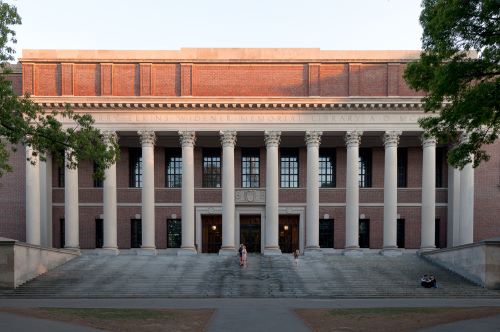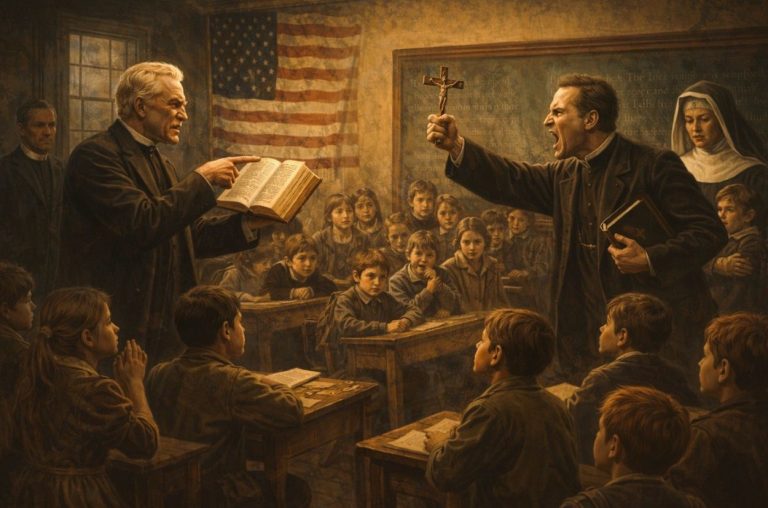

Conservatives are seeking to mold a society where power is insulated from truth.

By Matthew A. McIntosh
Public Historian
Brewminate
Introduction
In recent years, American universities have found themselves on the front lines of a growing cultural and political battle. Once celebrated as beacons of intellectual freedom and civic development, they are now increasingly portrayed by conservative voices as indoctrination factories, elitist enclaves, and hostile environments for “traditional values.” This systematic assault on higher education—rhetorical, legislative, and financial—marks a calculated effort to reshape the intellectual landscape of the United States.
At stake is not merely campus politics, but the future of critical thinking, open inquiry, and democratic discourse.
A Manufactured Crisis
The conservative narrative accusing universities of “liberal indoctrination” is not new, but it has intensified dramatically in the era of Donald Trump and beyond. Prominent Republicans, right-wing media outlets, and think tanks have framed colleges as institutions that brainwash students with leftist ideology. This sentiment has been echoed by high-profile figures such as Florida Governor Ron DeSantis, who has explicitly targeted public universities in his state for promoting “woke ideology” and diversity, equity, and inclusion (DEI) initiatives.
By portraying universities as hostile to conservative values, the Right has cultivated an image of academia as the enemy of the people—a cultural battlefield where traditional America must fight for its survival.
Legislative Offenses
The legislative dimensions of this crusade have been far-reaching. In states like Texas, Florida, and North Carolina, Republican lawmakers have introduced or passed laws that:
- Ban or defund DEI programs
- Restrict tenure and academic freedom
- Impose “intellectual diversity” mandates that force equal time for conservative views—even when unsupported by scholarly consensus
- Limit or outlaw teaching on race, gender, and American history in ways that contradict critical race theory bans
In Florida, the “Stop WOKE Act” allows students to sue professors if they feel offended by classroom material discussing systemic racism or privilege. Such measures not only chill academic discourse, but they redefine education as a form of consumer protection—where feelings outweigh facts and discomfort is rebranded as indoctrination.
This is not about balance; it is about control.
Targeting Liberal Arts and the Humanities
Especially vulnerable in this campaign are the humanities—fields like history, philosophy, literature, and gender studies—which conservatives frequently target as “useless” or ideologically subversive. In many red states, public funding for these programs is being slashed under the guise of promoting “workforce readiness” and “economic value.”
Yet this is a deeply ahistorical perspective. As this article on the value of liberal arts argues, these disciplines have long been central to the cultivation of citizenship, moral reasoning, and critical thinking—the very qualities a functioning democracy depends upon. Conservatives are not merely questioning curricular utility; they are de-legitimizing any education that fosters structural critique.
The New “Academic McCarthyism”
In some ways, the current conservative campaign resembles McCarthy-era purges in its logic and methods. Professors are being surveilled by groups like Campus Reform and Turning Point USA’s “Professor Watchlist,” which encourage students to report faculty who express views deemed too “liberal.”
In a chilling echo of Cold War blacklists, faculty have faced harassment, threats, and calls for termination simply for expressing personal opinions or teaching uncomfortable truths about race, gender, climate change, or American imperialism. The rise of cancel culture from the Right—a reality often overlooked in mainstream discourse—reveals that conservative critics are not against censorship, only against censorship that doesn’t benefit them.
Universities as Laboratories of Democracy
Historically, universities have served as laboratories of democratic engagement. From the civil rights era to anti-war protests, students and faculty have often led the charge for social progress. To undermine the university is to weaken one of the few remaining institutions committed to evidence-based reasoning and long-term public good.
When conservatives claim that universities no longer serve the public, they ignore how these institutions still produce medical innovation, scientific advancement, and civic leadership. The attack on universities is not about reforming education—it’s about restructuring society to benefit the powerful and silence dissent.
Follow the Money: Privatization and Corporate Capture
Ironically, while conservatives denounce public universities as radical leftist institutions, they simultaneously push for policies that defund them and open the door to privatization. By cutting public funding and increasing reliance on corporate donors, universities become more susceptible to market forces and less committed to independent scholarship.
The long-term goal is not merely to silence liberal professors but to transform the university into a corporate training ground. This reflects a broader trend of neoliberalism in education, as discussed in this analysis of education and the market. Education becomes a product; students become consumers; and critical thought becomes a liability.
What Comes Next?
Universities are not above critique. But the attacks from the Right are not rooted in a desire to improve education—they are designed to dismantle its democratic function. In silencing voices, rewriting curricula, and intimidating educators, conservatives are seeking to mold a society where power is insulated from truth, and ideology reigns over inquiry.
The fight to preserve American universities is not just an academic one. It is a fight for the soul of democracy.
Originally published by Brewminate, 06.24.2025, under the terms of a Creative Commons Attribution-NonCommercial-NoDerivatives 4.0 International license.


